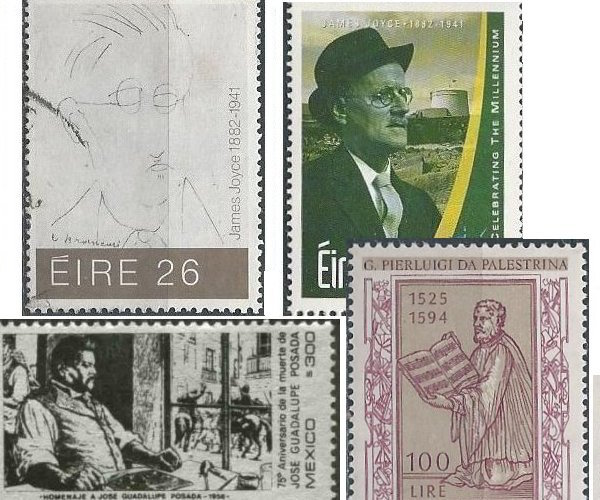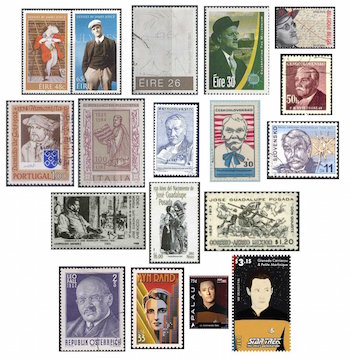The Arts on the Stamps of the World — February 2
An Arts Fuse regular feature: the arts on stamps of the world.

By Doug Briscoe
Top place today goes to James Joyce. Not only was he born on this date in 1882, but his masterpiece Ulysses was first published in book form (in Paris) on this date in 1922. (It had already appeared serialized between 1918 and 1920 in the American journal The Little Review.) So it’s fitting that our philatelic tribute should begin with a pair of Irish stamps celebrating both the man and this particular novel. A lover of music, the influence of which is keenly felt in his work, Joyce was talented enough as a tenor to have won the bronze medal in the 1904 Feis Ceoil just seven years after the festival’s founding. Joyce himself wrote a melody to his poem “Bid adieu”, his only known musical composition. His writings, in turn, have inspired hundreds of song settings, as well as operas and works in other forms. American composer Stephen Albert, who was killed in a car accident on Cape Cod in 1992, was particularly drawn to Joyce and won a Pulitzer Prize in 1985 for his RiverRun Symphony. More recently, Boston Baroque founder Martin Pearlman collaborated with Adam Harvey in an operatic adaptation—an “operoar”, as he called it—of Finnegans Wake. James Joyce died on 13 January 1941.
Damião de Góis (2 February 1502 – January 30, 1574) is known primarily as a humanist philosopher and friend of Erasmus, but he also wrote some music and perhaps a treatise on music theory. There are at least two surviving motets. Born and died in Alenquer, Portugal, he was imprisoned by the Inquisition for “singing and playing strange music in his house on the Sabbath.”
Giovanni Pierluigi da Palestrina, one of the very greatest Renaissance composers, was also thought to have come into conflict with the church, as can be seen in Hans Pfitzner’s opera on the subject; but modern research apparently shows that, according to Wikipedia, “the Council of Trent, as an official body, never actually banned any church music and failed to make any ruling or official statement on the subject.” Born around 1525 in the town of Palestrina, near Rome, he wrote over a hundred masses and 300 motets, along with some 300 other works. He died on this date in 1594.
Pavol Országh Hviezdoslav (1849 – 8 November 1921) is a prominent figure in Slovak literature. Born Pavel Országh in what was then the Kingdom of Hungary within the Austrian Empire, he adopted “Hviezdoslav” as a pseudonym in 1875. It was in that year that the cultural institute Slovak Matica was shut down by the repressive anti-Slovak policy of the Hungarian government. When the institute reopened after the First World War in 1919, Hviezdoslav was chosen to lead it. In the meantime, unable to get his patriotic poems published, he had worked twenty years in the legal profession. Aside from his poetry, he wrote two plays and other works and was remarkably active as a translator, undertaking translations from the German (Goethe, Schiller), Russian (Pushkin, Lermontov), Polish (Mickiewicz), Hungarian (Petőfi), and English (Shakespeare’s Hamlet and A Midsummer Night’s Dream)! For a time he served in the Czechoslovak parliament.

An interesting philatelic note about one of the four Hviezdoslav stamps shown here (second row center): an error was made in the original printing in which his name was misspelled “Orszách” rather than “Országh”, resulting in one of those rarities like the famous “Inverted Jenny”; this one, however, is not worth a fortune: according to the Scott Catalogue, while the corrected version is extremely common and sells for pennies, the error has a listed book value of around US$85.
Mexican political printmaker and engraver José Guadalupe Posada (1852 – January 20, 1913) got an early start as an artist from his school teacher brother, then at a drawing academy in Aguascalientes, and then in a workshop where he learned lithography and engraving. He contributed political cartoons to many periodicals, both before and after relocating to Mexico City in 1888. His use of skulls and skeletons as allegorical figures is exemplified by his work La Catrina, which has been adopted, as modified through the work of Diego Rivera, as a symbol of the Mexican holiday Día de muertos, or Day of the Dead (coinciding with Allhallowtide, October 31-November 2). Posada portrayed the daily lives and beliefs of the people, their exploitation, abuses of government, and popular stories of crime and passion. The effectiveness of his work has been a strong influence on many subsequent Latin American artists and cartoonists.
Austrian Jewish composer Leo Fall (1873 – 16 September 1925) wrote operettas, including Die Dollarprinzessin (The Dollar Princess, 1907) and Madame Pompadour (1922). He was active in Berlin, Hamburg, Cologne, and, of course, Vienna. Both of his brothers were also composers, and both died in the Holocaust, Richard at Auschwitz and Siegfried at Theresienstadt.

I daresay most readers of The Arts Fuse will agree that the less said about Ayn Rand the better, but she was born on this day ([O.S. January 20]) in Saint Petersburg, Russia in 1905, and she has a stamp. An interesting note of trivia: on arriving in the United States in 1926 she happened to meet Cecil B. DeMille and was hired to work as an extra in his film The King of Kings. Ayn Rand died on March 6, 1982.
Given the profusion of Star Trek stamps from around the world, it’s not surprising to find a few representing actor Brent Spiner (born February 2, 1949 in Houston) in his signature role as Lieutenant Commander Data in the TV series Star Trek: The Next Generation as well as in several of the movies of the franchise. Spiner also has a career as a singer. The stamps come from Next Generation sheets issued by Palau and Grenada.
Incredibly, no nation has yet issued a stamp to honor either Jascha Heifetz or Fritz Kreisler! Both were born on this date, Heifetz (O.S. 20 January) in 1901 (d. December 10, 1987) and Kreisler in 1875 (d. January 29, 1962).
A graduate of the University of Massachusetts with a B.A. in English, Doug Briscoe worked in Boston classical music radio, at WCRB, WGBH, and WBUR, for about 25 years, beginning in 1977. He has the curious distinction of having succeeded Robert J. Lurtsema twice, first as host of WGBH’s weekday morning classical music program in 1993, then as host of the weekend program when Robert J.’s health failed in 2000. Doug also wrote liner notes for several of the late Gunther Schuller’s GM Recordings releases as well as program notes for the Boston Classical Orchestra. For the past few years he’s been posting a Facebook “blog” of classical music on stamps of the world, which has now been expanded to encompass all the arts for The Arts Fuse.
